
THE VOICE OF INTERNATIONAL LITHUANIA
|
VilNews has its own Google archive! Type a word in the above search box to find any article.
You can also follow us on Facebook. We have two different pages. Click to open and join.
|
Sport & leisure
The Lithuanian Cinderella
- Posted by - (4) Comment
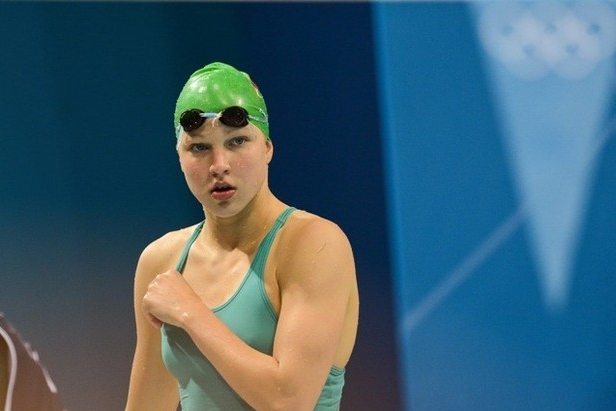
Rūta Meilutytė (born 19 March 1997). This week, at the Summer Olympics in London, she won the gold medal in the women's 100 meter breaststroke with a time of 1:05.47, becoming the first Lithuanian swimmer since Lithuania's Declaration of Independence from the Soviet Union in 1990 to earn an Olympic medal in swimming.
Photo: Wikipedia
Fifteen-year-old Rūta Meilutytė is a refreshingly outstanding representative of the original spirit of sports at a time when seriousness and the business aspects of sports often takes over for joy and the more fundamental aspects of the competitions.
Rūta has managed to grow strong, athletic and competitive-focused in spite of a difficult childhood in a country where training opportunities in swimming and many other sports are bad, because here in Lithuania it’s mostly just basketball that counts.
Her gold medal in the Olympics shows that even a young girl who is not raised and trained as a professional athlete since birth, can manage to reach even the highest goals in the sports world.
She is a true Cinderella of our days!
Rūta had just turned four years old when a terrible accident dramatically affected her and her family forever. Her mother, Ingrida, was on Easter visit to Vilnius and was about to cross a street in the pedestrian crossing when a car struck her so violently that she later died of the injuries.
Rūta's father, Saulius Meilutis, lived at this time in the United States, where he worked to support his family home in Lithuania, and Rūta started therefore living with her grandmother after her mother’s tragic death. She moved to the grandmother with her brothers Margiris and Mindaugas.
Already at an age of seven, her Kaunas coach, Giedrius Martinionis, seeing how well-built she was, told her father: ‘You must take her to swimming lessons – there will come a time when this little girl will be breaking country’s records’.
When Rūta was eight years old her father moved home from the United States. But like other returnees, it appeared difficult for him to find a decent job here, so after only three years he went west again, setting course for the southern English town of Plymouth where he got a job in a care home as a caregiver for disabled persons.
“When I left for Plymouth, my sons were somewhat grown and relatively mature, but I was worried about my daughter. After turning thirteen, Rūta had ceased listening to her grandmother. She wanted to be more independent. So I decided to take her with me to England,” her father tells to the daily Lietuvos Rytas.
Rūta had before this been showing good results in Kaunas Swimming School, so one of the most important tasks for the father was to find a good swimming club and an experienced coach in Plymouth.
He found one of England’s best swimming clubs and persuaded the coach Jonathan Rudd to work with his daughter. The road to success started.
“In addition to the sweet taste of victory, the father, however, sees the other side of the medal too, experiencing what it means to be a father not just occasionally but always. He looks after his daughter every single day of the year: from preparing breakfast, to advising what to wear,” the father tells to Lietuvos Rytas.
“Rūta loves herring or smoked bacon with onions, but I cannot treat her like that often, for such food is not good for a sportsperson. An adolescent girl undergoing a lot of physical exertion needs the proper, wholesome food. Before the afternoon training I usually prepare some pasta, which is rich in carbohydrates. While after the training it is usually a high protein meal such as meat or fish with vegetables. For breakfast she normally eats a cereal. I usually add some banana slices and nuts to them,” the father says about her diet.
“Rūta is tall, slim and has long legs. Her feet are rather long too: my daughter already wears size 43 shoes. She inherited these traits from her mother Ingrida, who looked like a model: she was slim and had long legs,” the father tells.
“Rūta’s character, however, is similar to mine: she is a very determined girl. She was supposed to be born in early April under the sign of Aries. However, she came to the world earlier than the doctors expected – on 19 March, under the sign of Pisces. Therefore I call her my little fish with a ram’s character,” laughs the father.
“Agility and physical strength marked Rūta since her childhood. She was very strong because she used to climb the trees as a child, along with her brothers. She was no less agile than the boys,” the father recalls.
Rūta stood out from the same age children with her apparent winning mentality.
Even in ball games at school she used to be a leader of her team. Her shots were very precise.
Continuous honest work also served to harden the able-bodied Rūta.
The family lived in their own house, so the girl used to help her grandmother around. Rūta used to cut the firewood and chop it with an axe, prepare garden beds and rake leaves.
Like the original Cinderella…
- Bookmark :
- Digg
- del.icio.us
- Stumbleupon
- Redit it
LT sportsmen in USA
- Posted by - (2) Comment

Šarūnas Jasikevičius, during EuroBasket 2011.
Text: Vin Karnila
Mention the words Sport and LITHUANIA and the next word you hear is always BASKETBALL. While a number of Lithuanian players have gone on to careers in the NBA it may surprise you to find out that quite a few Lithuanian athletes have had successful professional careers in the U.S.A. in other sports as well. What may be even a little more surprising is that these athletes excelled in what are considered “American” sports. As an example, did you know that the two players that most people say were the greatest players in the National Football League were Lithuanians?
BASKETBALL
Basketball is the sport that has tied Lithuania and USA closest together, so let’s first introduce you to the Lithuanian basketball stars “over there”.
Sarunas Jasikevičius
In July 2005 Sarunas Jasikevičius signed a three year contact with the Indian Pacers of the NBA. The point guard, who won three consecutive Euroleague championships, agreed to a three-year deal with the Pacers. Back in 1998, he was a solid wing player with Maryland, known for his shooting and intelligent play. He went back to his native Lithuania and plied his skills in club ball in Europe, becoming one of the best at his position. Arunas said “European ball is getting closer to the level of the NBA. I don't feel I have to play there to prove myself as a player,“
Žydrunas Ilgauskas

After being drafted by the Cleveland Cavaliers, Žydrunas Ilgauskas was selected to play in the 1997-98 Schick All-Rookie First Team. He was named MVP of the game, totaling a game-high 18 points and 7 rebounds, during the 1998 NBA All-Star Weekend in New York. Zydrunas led the Cavaliers in 1997-98 in field-goal percentage and blocked shots, ranked 2nd in rebounds, and 3rd in scoring. Unfortunately, he missed the entire 1996-97 season after undergoing surgery on his right foot. Ilgauskas rebounded to be named to the Eastern Conference All-Star Team in the 2002-03 season.
http://www.youtube.com/watch?v=Q-3z39HQwfg
Arvydas Sabonis

Arvydas Sabonis, now retired from the NBA, has been considered the best big man in the basketball world. In 1995 he said: "There's nothing left for me to prove in Europe or in the basketball world. Only the NBA remains."
But before that, he had been leading the Soviet national team to a gold medal at the 1988 Olympic Games in Seoul, South Korea. He also helped Lithuania to a bronze medal at the 1992 Olympics in Barcelona, and a second-place finish in the 1995 European Championships in Greece. In an 11-year professional career spent with club teams in the former Soviet Union and then in the Spanish League, Sabonis has led his squads to five league championships and has been named European Player of the Year four times by various publications. On August 20, 2010, Sabonis was inducted into the FIBA Hall of Fame in recognition of his great play in international competition.
http://www.youtube.com/watch?v=rsG9oApZtVI
Šarunas Marčiulionis

Šarunas Marčiulionis was a deadeye jump-shooter and capable of ferocious drives to the basket. He was a 1988 Olympic Games Gold Medal Champion in Seoul with Arvydas Sabonis.
Marčiulionis started his pro basketball career with Statyba Vilnius in the USSR League, the forerunner of the VTB United League in 1981. Drafted by the Golden State Warriors in the 6th round of the 1987 NBA Draft. He moved to the NBA in 1989 and he played four years with the Warriors, finishing as the runner-up for the Sixth Man of the Year Award in both 1992 and 1993. Marčiulionis became one of the first Europeans to get significant playing time in the NBA, helping to lead the way for the internationalization of the league in the late 1990s. After missing a year and a half with a leg injury, he was traded to the Seattle Super Sonics in 1994, then traded to the Sacramento Kings in 1995, and he finished his NBA career with the Denver Nuggets in the 1996-97 season. Having a career hampered by injury, he was on brink of making a real impression on the league before getting hurt.
Sarunas is today known as a hotel owner in Vilnius, as Founder of the Basketball Funds in Lithuania and the USA, as Founder of a private Basketball School and the Lithuanian Basketball League. In April, 1998 Sarunas became Extraordinary and Minister Pleni Potenciary of the Embassy of the Republic of Lithuania in the USA, and in 1999 he founded North European Basketball League NEBL and became its Commissioner.
http://www.youtube.com/watch?v=schzjV2RiN4
http://www.youtube.com/watch?v=fumWbJomIS4
Frank Lubin / Pranas Lubinas

Frank Lubin / Pranas Lubinas (1910 - 1999) is often called the Grandfather of Lithuanian basketball as he promoted basketball in Lithuania and helped Lithuania win its second European championship in a row. He became an Olympic champion with the US team in 1936 in Berlin, and a European champion with the Lithuanian team in 1939 in Kaunas. He was born in Los Angeles in a family of Lithuanian emigrants, studied at UCLA University and was entered into the UCLA hall of fame in 1997. He played in AAU tournaments for about 30 years.
AMERICAN FOOTBALL
Johnny Unitas / Jonas Jaunaitis

Johnny Unitas / Jonas Jaunaitis (1933 - 2002) was a professional American football player in the 1950s, 1960s and 1970s. Unitas is considered by many to have been one of the best quarterbacks to ever play the game. He was the National Football League's most valuable player in 1957, 1959 and 1964. Unitas was born in Pittsburgh, Pennsylvania in 1933. Johnny's father died when he was five years old and he was raised by his Lithuanian immigrant mother who worked two jobs to support the family.
Unitas set many passing records during his career. He was the first quarterback to throw for more than 40,000 yards, despite playing during an era when NFL teams played shorter seasons of 12 or 14 games (as opposed to today's 16-game seasons). His 32 touchdown passes in 1959 were a record at the time, making Unitas the first QB to hit the 30 touchdown mark in a season. His 47-game touchdown streak between 1956 and 1960 is a record that still stands and is considered by many the football equivalent of Joe DiMaggio's 56-game baseball hitting streak
Here is a short list of some of his other achievements:
Unitas held the record for most Pro Bowl appearances (10) by a quarterback until Brett Farve broke his record in 2009.
Unitas set the original standard for most wins as a starting quarterback with 118 regular season victories.
In 2004, The Sporting News ranked Unitas No. 1 among the NFL's 50 Greatest Quarterbacks, with Joe Montana No. 2.
Since 1987, the Johnny Unitas Golden Arm Award has been awarded to the top senior quarterback of the current year in college football.
http://www.youtube.com/watch?v=skVj2JppOOg
http://www.youtube.com/watch?v=0R-vbUvI6Bs
Dick Butkus

Dick Butkus is the man about whom the American sports press wrote; “It is possible that Butkus was the meanest, nastiest, fiercest linebacker to ever put on a helmet”. More than a quarter of a century after his retirement, there remains the Butkus image: the middle linebacker wrapping up a running back and viciously slamming him to the ground like an unwanted toy.
He was selected to eight Pro Bowls and was all-league six times. In his rookie season, Butkus led the Bears in tackles, interceptions, forced fumbles, and fumble recoveries, and regularly led the team in these categories throughout his career. Butkus recovered 27 fumbles in his career, a NFL record at the time of his retirement. He was one of the most feared players of his era and even appeared on the cover of Sports Illustrated in 1970 with the caption "The Most Feared Man in the Game." He had one of his most productive seasons in 1970 with 132 tackles, 84 assists, 3 interceptions and 2 fumble recoveries. He was forced to retire after multiple knee injuries in 1973.
http://www.youtube.com/watch?v=zBumQdwc-tE
http://www.youtube.com/watch?v=sxR9qYSHt8U
BASEBALL
Vito Tamulis

Vito Tamulis (1911 - 1974) was born in Cambridge, MA. He was a sensation at Boston English High, pitching his school to the city championship in 1930. Turning down several college scholarship offers, Yankees scout Gene McCann signed him shortly before his 19th birthday. He worked his way up the Yankee chain, with a carreer culminating in 1934 with the Newark Bears. The Newark teams during the 1930 are rated as among the one hundred best minor league teams of all time. Vito Tamulis continued to live in the Nashville area until his death in 1974.
Joe Krakauskas

Joe Krakauskas (1915 – 1960) was a Major League Baseball pitcher who played for seven seasons. He played for the Washington Senators from 1937 to 1940 and the Cleveland Indians from 1941 to 1942 and 1946. He was 11-17 at his most active, with the 1939 Senators.
Eddie Waitkus

Eddie Waitkus (1919 – 1972) was the baseball player who inspired the movie, The Natural, starring Robert Redford as Roy Hobbs. This is a true story of a great baseball player, whose entire life was totally changed, because of an act of a single obsessed fan.
As the son of Lithuanian immigrants, Edward Stephen Waitkus grew up in Boston and served in the Pacific during World War II. His army service in some of the war’s bloodiest combat earned him four Bronze Stars. On the night of June 14, 1948, at the Edgewater Beach Hotel, Waitkus’s bright career took an infamously tragic turn. He received a cryptic note summoning him to meet a young fan, Ruth Steinhagen. When Waitkus entered her hotel room, she proclaimed, “I have a surprise for you,” and then she just as quickly shot him in the chest. He survived, and in his final summers he worked with youngsters at the Ted Williams baseball camp. Cancer claimed him in 1972, just days after his fifty-third birthday.
Eddie Miksis

Eddie Miksis (1926 - 2005) was 17 years old when he made his major-league debut on with Brooklyn. In 1953, he had a career-high with the Cubs and appeared in eight World Series Games -- five with the Dodgers in 1947 and three with the Dodgers in 1949. He was traded to the Cardinals in 1957 and finished up his career with Baltimore (1957-1958) and Cincinnati (1958). He lived in Philadelphia following his retirement from baseball.
Bill Sudakis

Bill Sudakis homered for Los Angeles in his first major league game. The Dodgers' third baseman in 1969, he was made a catcher and had won the everyday job in 1970 when he broke a finger. He became a versatile utilityman. More than one-third of Sudakis's hits were for extra bases.
BOXING
Jack Sharkey / Juozas Zukauskas

Jack Sharkey / Juozas Zukauskas (1902 - 1994) is the only man to have fought both Jack Dempsey and Joe Louis. But he may be best remembered for a pair of controversial title fights with German Max Schmeling. Sharkey fought for the vacant world title in 1930 against Schmeling but was disqualified for hitting below the belt in the fourth round. In 1932, he met Schmeling once again. The champion appeared to have a clear decision but the fight was awarded to Sharkey on a split decision. In his first title defense, Sharkey was knocked out by the mob-connected Carnera in the sixth round. As he did in 1931, Sharkey began by easily outboxing Carnera for the first five rounds. But he was floored with a right uppercut in round six and counted out. Many felt the fight was fixed but Sharkey denied the accusation until his death.
HOCKEY
Dainius Zubrus

Dainius Zubrus, born in Elektrenai, Lithuania, was drafted 15th overall in the 1996 NHL Entry Draft by the Philadelphia Flyers. He made his NHL debut on October 5, 1996, scoring a goal against the Florida Panthers. In his rookie season, he helped the Flyers reach the Stanley Cup final.
The Flyers traded him to the Montreal Canadiens on March 10, 1999. He registered his first career hat-trick on October 14, 2000, against the Chicago Blackhawks, and was traded by the Canadiens to the Washington Capitals on March 13, 2001.
During the 2005-06 season he posted a career-high 57 points. In the 2006–07 season, Zubrus continued his impressive form posting 52 points in 60 games before he was traded to the Buffalo Sabres February 27, 2007.
On July 3, 2007, Zubrus a free agent, signed a six-year, $20.4 million dollar deal with the New Jersey Devils. On November 23, 2008, Dainius Zubrus had one of the best offensive games in Devils history. Zubrus tied a team record with four goals to help New Jersey win its season-high fourth straight game, 7–3 over the Tampa Bay Lightning.
At 6 ft 5 in/1.96 m and 224 lb/102 kg. he is considered a “power forward” in the NHL. His size allows him to effectively use the body when needed but in spite of his size he is considered one of the most graceful skaters in the league along with being a good scorer and a very effective play maker.
http://www.youtube.com/watch?v=cW66VP6rERY
Darius Kasparaitis

Darius Kasparaitis gave up his parental home in Elektrenai, Lithuania at the age of twelve to pursue a dream of becoming a professional hockey player which was an unusual route in a country that is dominated by basketball.
Kasparaitis played his first professional game for Dynamo Moscow, one of the premier teams in the Soviet Union, at the age of 16 during the 1988–89 season, and won the Soviet League championship with them in 1992.
He was drafted by the New York Islanders with the fifth overall pick in the first round of the 1992 NHL Entry Draft. Kasparaitis is known for his aggressive physical playing style and has led his teams in hits several times, including his rookie season, in 1992–93 NHL season with the New York Islanders. Kasparaitis has played for the New York Islanders, Pittsburgh Penguins, Colorado Avalanche and New York Rangers. Playing for Pittsburgh he scored a game seven overtime goal vs. Buffalo in 2001. Kasparaitis eventually wound up with the New York Rangers and during the 2005–06 season he served as their alternate captain.
http://www.youtube.com/watch?v=CoyoJ-Un77Y
TENNIS
Vitas Gerulaitis

Vitas Gerulaitis (1954 - 1994) was a highly sucessful professional tennis player. Born in Brooklyn, New York, his biggest success was winning the men's singles title at the Australian Open in 1977, when he defeated John Lloyd in five sets.
Gerulaitis led the Pittsburgh Triangles to the World Team Tennis championship title at Pittsburgh's Mellon Arena in 1975. He also won the men's doubles title at Wimbledon in 1975. He was a singles semi-finalist at Wimbledon in both 1977 and 1978. In 1977, he lost a long Wimbledon semi-final to his close friend and practice partner, Björn Borg 6–4, 3–6, 6–3, 3–6, 8–6. In 1978, Gerulaitis won the year end championship WCT Finals for the World Championship Tennis tour, winning over Eddie Dibbs 6–3, 6–2, 6–1.
In 1979, Gerulaitis lost in men's singles finals at the US Open to fellow New Yorker John McEnroe in straight sets. He was a member of the United States team which won the Davis Cup in 1979. In the final, he won two singles rubbers as the US beat Italy 5–0.
Gerulaitis reached his third Grand Slam singles final in 1980, when he lost in the final of the French Open to Björn Borg in straight sets.
During his career, Gerulaitis won 25 top-level singles titles and 8 doubles titles. His career-high singles ranking was World No. 3 in 1978. He retired from the professional tour in 1986.
He died in a tragic accident in 1994 at age 40. While visiting a friend's home in East Hampton, Long Island, a malfunction in the air-conditioning system caused odorless poisonous carbon monoxide gases to seep through the house, leading to his death. Intensely proud of his Lithuanian heritage, Gerulaitis was well known for correcting reporters when they mispronounced his name.
- Bookmark :
- Digg
- del.icio.us
- Stumbleupon
- Redit it
- Posted by - (3) Comment
Lithuanian-American Johnny Podres (1932-2008):
US baseball’s ‘most
valuable player’ in 1955
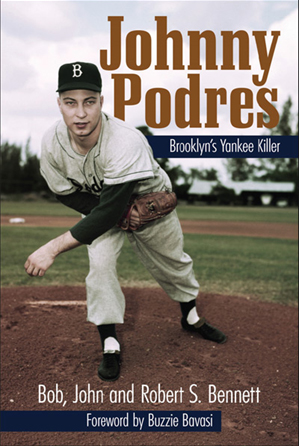
Johnny Podres, Lithuanian American, son of immigrant parents, born and raised Upstate New York, pitched two historic World Series wins against the New York Yankees in 1955. The World Series championship was the one and only victory in the history of the "Brooklyn" Dodgers. Subsequently, the Dodgers (and Podres) moved to Los Angeles in 1958.
People always said the cigarettes and the gambling and the whiskey and the late hours would surely get Johnny Podres. In 2008, those experts were proved right. Now they’re going to have to explain how The Pod made it to 75.
Podres was one of those fortunate human beings who was born exactly when he should have been. He pitched for the Dodgers when they desperately needed a young lefthander who would go out for the ninth inning of Game 7 of a World Series they had never won, would flick aside his cigarette, utter a what-the-hell and go out and finish shutting out the Yankees.
That’s what The Pod did in 1955, winding up airborne in the embrace of Roy Campanella, and when the Dodgers celebrated their first championship at the old Bossert Hotel that night, the party revolved around Podres.
“He and Don Drysdale were the Pied Pipers,” Vin Scully recalled Monday. “Johnny and Don Zimmer and Ed Roebuck would go out, and then Drysdale would have half the team following him. And Sandy Koufax would be eating dinner with Doug Camilli, who was the thirdstring catcher.
“When we went to Cincinnati, Johnny and his guys would go over to Kentucky and gamble all night. Roebuck once told them, ‘If I’d never met you guys, I’d be a millionaire.’ ’’
“What amazed me,” Roebuck said, “was the way Johnny would go out and have a good time every night except the night before he pitched. He would always turn in and get a good night’s sleep. If I did that I’d be staring at the ceiling.”
There was the day Zimmer and Podres called General Manager Buzzie Bavasi from a racetrack in Detroit. They owed Buzzie $100 each, but now Podres told him he’d put $200 on this sure-fire horse and they’d be even. Bavasi hung up the phone and told his secretary, “I just lost $200.” Sure enough, Podres called back later to explain that, miraculously, the 12-to-1 shot once again got nipped at the end.
It’s uncertain how Podres would have made it through baseball these days, with the personal trainers and the pitch counts.
But Podres was the pitching coach of the Phillies when they won the National League in 1993. On his blog Monday, Curt Schilling said Podres influenced him more than anyone outside his own family. When Frank Viola won the 1988 Cy Young Award, he credited Podres, who taught Viola the same changeup that worked in ’55.
Podres was not the obvious nominee to pitch that Game 7. He was 9-10 that year, and he’d gotten pasted in a World Series game in 1953, and he was facing veteran Tommy Byrne, who passed away in December, 23 days before Podres did.
“Thing is, even in spring training, he was always really good against the Yankees,” Roebuck said.
Some Dodgers remember Podres proclaiming that he only needed one run. Scully doesn’t think
Podres was ever that brash. “But he did say he wasn’t nervous, he didn’t feel the pressure, because in his mind he had nothing to lose,” Scully said.
Eight hits, eight left, no runs.
“Somebody was looking after me,” Podres said.
Somebody always was.
Podres grew up in Witherbee, N.Y., son of an iron miner. “We kept hearing about this ice fisherman who was going to be joining us,” Scully said.
He always remembered coming out of a tryout camp and then hearing General Manager Branch Rickey tell someone, “Don’t let that boy get away.”
Podres went 21-3 for the Dodgers’ Class-D farm club in Hazard, Ky., in 1951. “I was the original Duke of Hazard,” he would say. Two years later, he was the youngest player in the majors.
After the Dodgers moved to L.A. he was in the rotation for six years, went 18-5 in 1961, won two games in the ’59 World Series, and beat the Yankees again in Game 2 of the ’63 World Series.
He also pitched the first game in Dodger Stadium. In 1969, he came off an idle year to join the expansion Padres, at Bavasi’s behest, and blanked Houston over 8 1 /3 innings in their second game ever.
Later, the Twins made him their pitching coach in Walla Walla. He gathered his rookie pitchers and asked who the beer drinkers were. Several raised their hands.
“Good, you’re my starters because you need your rest between games,” Podres said. “The rest of you, you milkshake drinkers, you’re the relievers, because you can pitch every day.”
Zimmer was in Montreal one year when he found out Podres had suffered a heart attack. He drove down to Glens Falls, N.Y., to visit. When he walked in, a bed-ridden Podres handed him a betting slip and told him to hurry to the OTB parlor before post time. “And don’t tell my wife,” he said.
The years finally caught up to Podres in 2008. Now, that’s a pursuit of happiness.
- Bookmark :
- Digg
- del.icio.us
- Stumbleupon
- Redit it
- Posted by - (2) Comment
The other dream team
New film about Lithuania’s 1992 basketball team
 The Other Dream Team is a documentary film directed by Marius A. Markevičius (picture). The inspirational story of the 1992 Lithuania national basketball team and their incredible journey from the clutches of Communism to the Summer Olympics in Barcelona. It stars many famous basketball persons like Yao Ming, Arvydas Sabonis, David Stern, Jim Lampley, Bill Walton, Šarūnas Marčiulionis, Paul Gasol and others. The film should be released in 2012.
The Other Dream Team is a documentary film directed by Marius A. Markevičius (picture). The inspirational story of the 1992 Lithuania national basketball team and their incredible journey from the clutches of Communism to the Summer Olympics in Barcelona. It stars many famous basketball persons like Yao Ming, Arvydas Sabonis, David Stern, Jim Lampley, Bill Walton, Šarūnas Marčiulionis, Paul Gasol and others. The film should be released in 2012.
When you hear the words "dream team" the names such as Michael Jordan, Magic Johnson, Scottie Pippen come to your mind. That's the squad of USA national team in Barcelona Olympic Games 1992. But that wasn't the only team in Barcelona which deserves the title "dream team". The other dream team was Lithuania.
The moment of Lithuania returning to the world's basketball family and instantly winning bronze in the Olympic Games was a unique moment in the history of basketball, memories of which brings NBC Sports Broadcaster Jim Lampley to tears. The full movie features many basketball legends such as Bill Walton, Šarūnas Marčiulionis and more.
TalkBasket.net presents you the trailer of the new documentary by Marius A. Markevičius called "The other dream team". Enjoy the video.
- Bookmark :
- Digg
- del.icio.us
- Stumbleupon
- Redit it
Arvydas Sabonis to the NBA Hall of Fame
- Posted by - (4) Comment
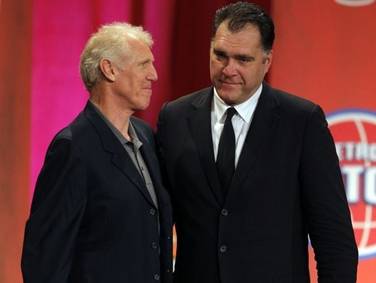
Arvydas Sabonis with ex Portland Trailblazers team
mate Bill Walton during the induction ceremonies
Photo: Reuters.
For a country that proclaims their second Religion to be Basketball, you can imagine the excitement that is growing as EuroBasket 2011 draws near. The tournament that crowns the Basketball Champions of Europe always creates great emotion in the hearts of Lithuanians but this year there is even more fuel to add to the passionate fire because the championship tournament is being held in Lithuania.
Everyone is counting the days, hours and minutes to 31 August at 9 PM EET when Lithuania plays their first game. Everywhere you look people are wearing Lithuanian Basketball T-shirts, cars are decorated in the National colors and banners and posters are everywhere.
Now what could take place that would add even more to the basketball fever that has infected everyone?
You induct into the NBA’s Hall of Fame the greatest basketball ever to come from Lithuania. Yes folks, Friday 12 August Arvydas Sabonis was inducted into the National Basketball Association’s Hall of Fame in Springfield, Massachusetts.
Said by most to be the greatest “big man” to ever play the game, he is also considered to be one of the greatest centers to play the game and some even say that he was the greatest center in the world.
Watch his induction speech here:
This video is from the induction show. Some great insight to Sabonis’ tremendous abilities and also some great action videos that displays Arvydas’ mindboggling skills. Fellow team mate and NBA Hall of Fame member Bill Walton refers to Arvydas Sabonis as a 7 foot 3 inch Larry Bird – This is quite a compliment.
- Bookmark :
- Digg
- del.icio.us
- Stumbleupon
- Redit it
- Posted by - (1) Comment
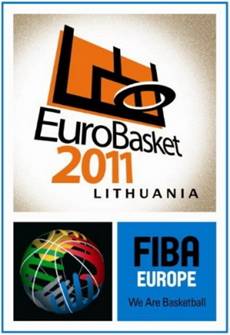
Mark your calendars
to be in Lithuania
31 August to 18 September
for
EuroBasket 2011
For 2011, LITHUANIA has been chosen as the host country for one of the most prestigious Sport’s Tournaments in Europe and the World. This is the second time in the Tournament’s rich history that Lithuania has been chosen to host the Basketball Championship of Europe.
EuroBasket 2011 will crown the Basketball Champion of Europe. While this is an important event for all European countries, it is especially important for a country like LITHUANIA that proclaims Basketball as its “Second Religion”.
The EuroBasket Championship saw its first tournament held in Geneva, Switzerland in 1935. Since then, every two years the greatest teams and talent have met for the “bragging rights” of Europe.
Throughout the history of the tournament our Lithuanian Team has done very well.
Clip about European mens basketball championship which will be held in
Lithuania 31 August – 18 September 2011.
In the second EuroBasket Tournament held in Riga, Latvia in 1937
Lithuania won the Gold with the final three results being
GOLD ![]() Lithuania
Lithuania
SILVER ![]() Italy
Italy
BRONZE ![]() France
France
Lithuania was the host country for the Tournament in 1939 with Kaunas acting as the host city.
Once again our athletes showed the best of the rest what they were made of
capturing the Gold again for a second time in a row with the final three results being
GOLD ![]() Lithuania
Lithuania
SILVER ![]() Latvia
Latvia
BRONZE ![]() Poland
Poland
After 1939, the Tournament was put on hold because of the war but it resumed again in 1946. Unfortunately though, due to the occupation of Lithuania by Soviet Russia, Lithuania was not allowed to enter a Lithuanian Team into the Tournament. The same was true for the other countries occupied by Soviet Russia. However, the top players from Lithuania and many other occupied countries were joined together with players from Russia to make up the basketball team representing the U.S.S.R. As you can imagine, with all of this combined talent on one team, the U.S.S.R. was a dominant force until 1990. In many of the U.S.S.R.’s victories, it was players from Lithuania that made up the nucleus of the team.
With Lithuania finally regaining its independence, 1995 saw for the first time in more than fifty five years a team representing the free Republic of Lithuania. In this Tournament played in Athens, Greece it was a beautiful site to see our players once again adorned in the uniform of our National Colors with “LIETUVA” emblazoned on them. They did not disappoint and picked up right where they left of by earning the Silver medal with the final three results being
GOLD ![]() Yugoslavia
Yugoslavia
SILVER ![]() Lithuania
Lithuania
BRONZE ![]() Croatia
Croatia
They followed up this success with two more medals.
2003 in Stockholm, Sweden saw Lithuania back on top
of the Basketball mountain of Europe with a Gold medal.
GOLD ![]() Lithuania
Lithuania
SILVER ![]() Spain
Spain
BRONZE ![]() Italy
Italy
In 2007 in Madrid, Spain they again brought home some hardware earning the Bronze.
GOLD ![]() Russia
Russia
SILVER ![]() Spain
Spain
BRONZE ![]() Lithuania
Lithuania
How will these past successes influence Team Lithuania’s chances for Gold in 2011???
Please allow me to share with you some facts to shed some light on Lithuania’s
dominance of the Tournament over the years.
Since 1935 there have been 37 EuroBasket Tournaments take place.
Due to the occupation of Lithuania by Soviet Russia, Lithuania was only able to participate in 12
of these Tournaments with a team representing Lithuania wearing the
Amber, Green and Red national uniform.
So please keep this in mind – Played in only 12 out of 37 EuroBasket Tournaments
Lithuania is 7th overall in medals
Lithuania is 3rd over all in Gold medals
Quite an accomplishment considering they played in only 35% of the Tournaments
Now what about the players?
Here is a list of players that received the MVP award for the entire Tournament
1937 – Pranas Lubinis
1939 – Mykolas Ruzgys
1995 – Šarūnas Marčiulionis
2003 – Šarūnas Jasikevičius
Here are the players that received the MVP award while playing on the
U.S.S.R. team during the occupation years.
1965 – Modestas Paulauskas
1985 - Arvydas Sabonis
Twice players from Team LIETUVA were the Top Scorers of the Championship
1937 – Pranas Lubinis
1995 - Šarūnas Marčiulionis
As you can see Lithuania has a history of winning and there is good reason to believe that this history will repeat itself in 2011. The players and the fans are still sky high after their come from no where win of the Bronze in last year‘s World Basketball Championship held in Turkey. Their only loss in that Tournament was to the Gold Medal winning team of the USA.
Combine that with the fact that they will be playing in Lithuania in front of Lithuanian fans that have traveled from all over the globe to cheer on their team and you have the formula for success.
So mark your calendars and make you reservations.
Round 1 is from 31 August to 5 September
This is the Elimination Round
This round will be played in the cities of Alytus, Klaipėda, Panevėzys and Šiauliai
There will be four groups of six teams fighting to go to the next round
All of Team Lithuania‘s Round 1 games will be played in Panevėzys.
Round 2 will be from 7 to 12 September
There will be two groups of six teams competing to go on to the Final Round
All of these games will be played in Vilnius in the Siemans Arena
Round 3 is the Medal Round
The eight remaining teams will do battle to see who goes home with the Gold
This round will be from 14 to 18 September
All of these games will be played in Kaunas in their new state of the art arena
We will keep you informed about the ticket sales as the information is released.
FOR FURTHER INFORMATION ABOUT THE PROGRAMME, VENUES AND TEAMS:
http://en.wikipedia.org/wiki/EuroBasket_2011
So make plans to come to LIETUVA to support
YOUR home team!!!

- Bookmark :
- Digg
- del.icio.us
- Stumbleupon
- Redit it
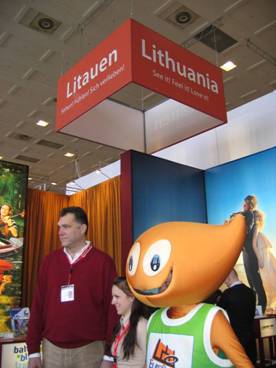 Sabonis at the “Berlin ITB”, held 9 – 13 March |
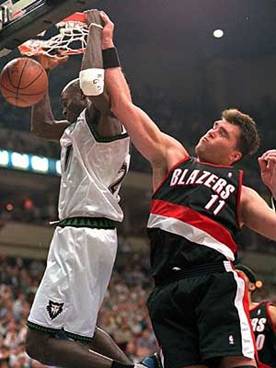 AP photo |
In Lithuania, basketball has an almost religion-like status and a big part of the population considers hosting a EuroBasket an once-in-a-lifetime experience.
In this context, it's easy to understand why the EuroBasket 2011 official ambassador needed to be a "larger than life" figure. Luckily, figures -Lithuanian or otherwise- don't come any bigger than that of Arvydas Sabonis.
The basketball legend who revolutionized the game in the 80's, when he showed the world that a big (2.22m big to be precise) player could pass the ball like a point guard and shoot from long range even better than one, was the automatic choice when the LOC and FIBA Europe asked themselves who better personifies Lithuania and EuroBasket 2011.
Sabonis, in his capacity as the official ambassador has been promoting the event all over Europe since late October. "This is a big day for our country, after 72 years basketball is coming back to Lithuania",
"We built five new arenas, EuroBasket is very important for our young players and for all Lithuanians, for us basketball is like a second religion."
Arvydas Sabonis was in Berlin, Germany
promoting Lithuania and EuroBasket 2011
at the “Berlin ITB”, held 9 – 13 March,
which is one of the largest World Tourism Fairs in the world
Photo courtesy of Vilija Turiene www.inviabaltic.lt
When asked what he thought of Spain, Turkey, Great Britain and Poland (plus the second team to come out of the Additional Qualifying Round) being drawn in the same group with the host country, he smiled and said "of course our group is a little bit tough, but what happened, happened."
As someone who has four Eurobasket medals in his collection (one Gold, one Silver, two Bronze) and was named European player of the year on six different occasions, Sabonis is well qualified to speak of Lithuania's chances in the tournament.
"Last year we had a new team, now we have the chance to make it even stronger with young players and with some others that couldn't play because of injury,"
Sabonis is a man of few words. As one of the biggest players in the history of the game, he knows it's actions that count. To that effect, he has done more than his fair share to bring to prominence some of these young players he's talking about. The Sabonis Basketball School was founded in 1994 and its mission is to teach young players the fundamentals of the game. Last year alone, as many as 800 promising students attended the program in the school's state of the art centre. School graduates include Lithuania internationals Martynas Andriuskevicius, Jonas Maciulis or Paulius Jankunas.
It's all part of the vision Sabonis has for both his country and basketball, a vision that will be fulfilled when EuroBasket 2011 tips off on 31st August. It's obvious the official ambassador can hardly wait: "We want the whole of Europe to see how we live here, how we love basketball," he says with expectation.
Information courtesy of EuroBasket 2011
- Bookmark :
- Digg
- del.icio.us
- Stumbleupon
- Redit it
Lithuanian sport A – W
- Posted by - (35) Comment
Ramūnas Vyšniauskas, the weightlifter whose medal collection contains European silver and bronze medals.
There are over a hundred different kinds of sports in Lithuania, with the top three most popular sports being basketball, football, track-and-field. Check this web page to read more: http://lietuva.lt/en/sport
- Bookmark :
- Digg
- del.icio.us
- Stumbleupon
- Redit it
VilNews e-magazine is published in Vilnius, Lithuania. Editor-in-Chief: Mr. Aage Myhre. Inquires to the editors: editor@VilNews.com.
Code of Ethics: See Section 2 – about VilNews. VilNews is not responsible for content on external links/web pages.
HOW TO ADVERTISE IN VILNEWS.
All content is copyrighted © 2011. UAB ‘VilNews’.

 Click on the buttons to open and read each of VilNews' 18 sub-sections
Click on the buttons to open and read each of VilNews' 18 sub-sections 






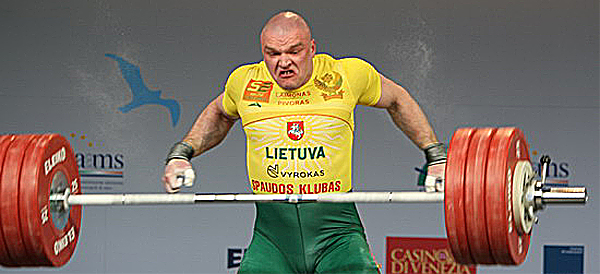









.jpg)



